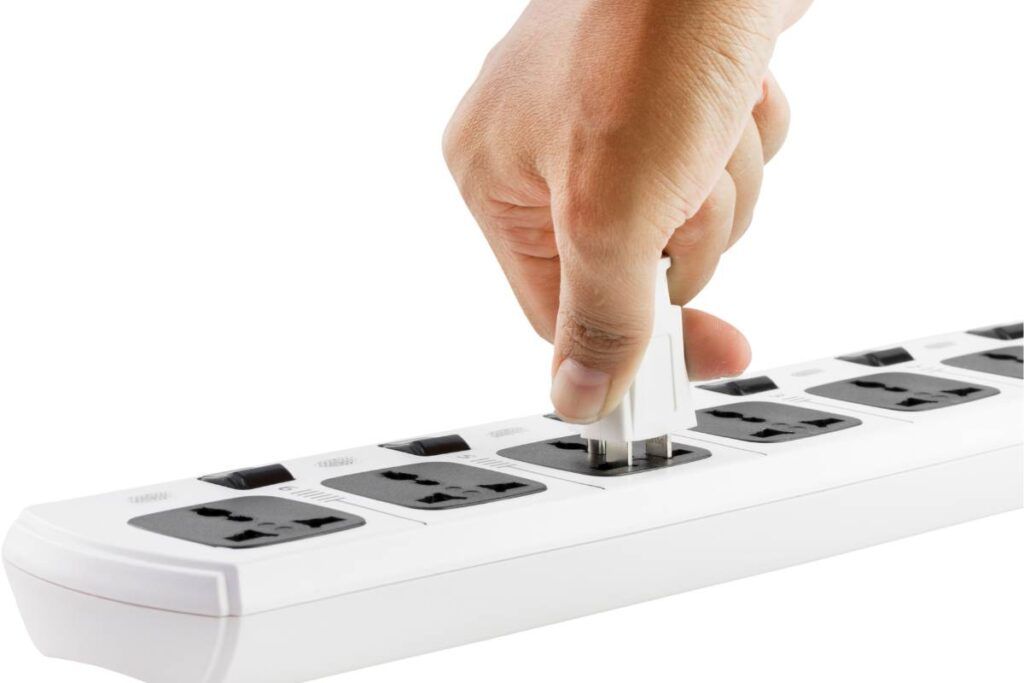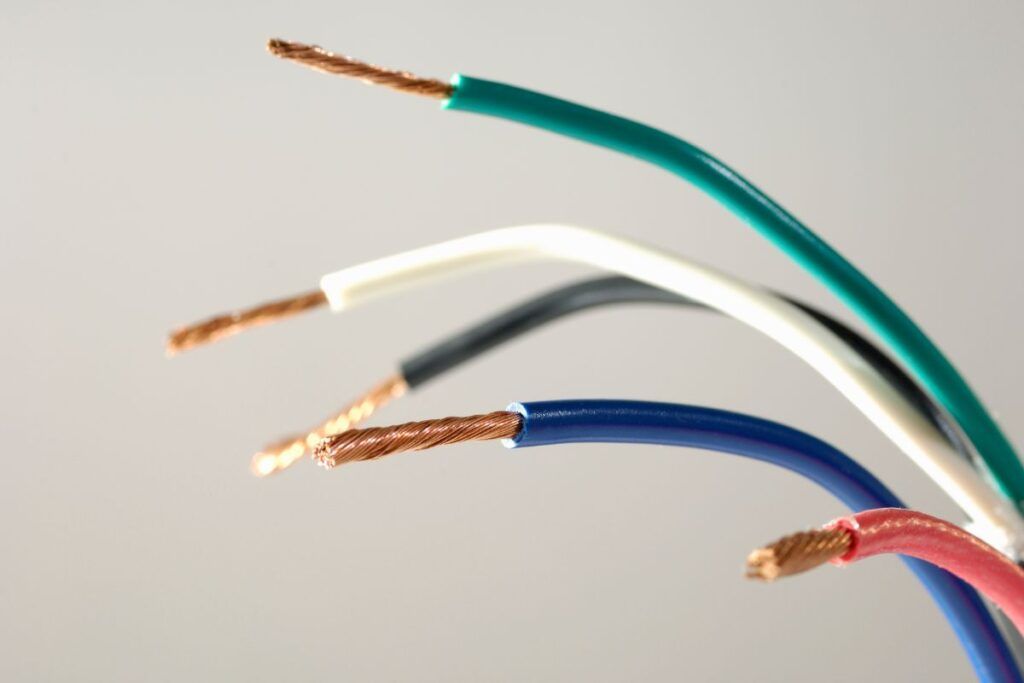Most of us are habituated to using extension cords for every small appliance. But it is risky to plug an air conditioner into the extension cord. Today, we will discuss the possibility of plugging an AC into the extension cords.
You can plug an air conditioner into an extension cord, but there is a risk of overload and short circuits. To avoid the risks, you should use the right extension cord with the right gauge and length suitable for your unit. It would be best to use it for temporary purposes.
Extension cords come in various types. In this guide, we shall explore the circumstances where you can plug your unit into the extensions, the right extension, and the risks of doing it.

Check out our list of top-handpicked products for all your electrical, appliance, and HVAC system needs to keep your home running smoothly.
This post includes some affiliate links.Can I use an extension cord for my air conditioner?
Using extension cords for your air conditioners is not at all safe. That is why manufacturers do not make extension cords for such heavy-duty appliances.
The very first reason is the unit’s motor. The air conditioner’s motor uses a lot of current loads to start the compressor.
The extension cords can cause the voltage to drop when the motor draws the current.
As a result, the air conditioner will generate more heat and damage the motor.
The outlets of the units should be close to the unit, and a professional will do it.
The next best thing includes short and thick conductors.
The shorter cords have less resistance and low voltage drops than the longer ones.
However, some manufacturers make extension cords for heavy-duty appliances.
These extension cords are specially designed to safely transfer the current used by the appliances like air conditioners.
How much current does an air conditioner draw?
Whether using an extension cord for an air conditioner is safe depends on the amount of current drawn by the unit.
Different air conditioners have different capacities.
So, the amount of current drawn is different.
A 12,000 BTU air conditioner can draw around 8.7 to 13 amps of current.
On the contrary, a 14,000 BTU air conditioner will draw around 12 amps of current, based on the EER.
If the unit runs for 3 hours or more, it will draw a substantial amount of current while operating.
Risks of running an air conditioner in extension cords
If you still think of running an air conditioner in the extension cords, read the following points before doing it:
Thinner cords cannot handle the air conditioner.

The extension cords are lighter and thinner than the air conditioner’s stock cords and regular house sockets.
The average wattage of the air conditioner is around 1,118W, which is more than the regular extensions.
Plug your air conditioner into a grounded house socket for safety.
Overheating
The air conditioners are heavy-duty appliances.
They absorb too much power to run at their best.
The air conditioner can start a fire if you use an extension cord.
The extension cords will increase the distance of the current and make it travel long to reach the unit.
Longer distance means higher resistance, leading to overheating and fire hazards.
Voltage drop and fluctuations
Extension cords affect the air conditioner’s performance and efficiency.
The extension cords are thinner, and the current needs to flow for long distances.
As a result, there will be a higher voltage drop.
You cannot let your air conditioner have low voltage fluctuations as that will stall the motor.
Even the compressor will face difficulties.
The air conditioner’s compressor should have a proper torque level to work.
A high voltage will increase the torque, and a low voltage will reduce the torque level of the motor.
If the torque level is low, it will hinder the motor.
If you do not have a separate outlet for your air conditioner, call an electrician to install one next to the unit.
No circuit breaker
Since an air conditioner is heavy-duty and draws more power than the other appliances, it should have a separate circuit breaker.
Circuit breakers will protect your house from electrical hazards.
Extension cords do not have any circuit breakers.
So, your house may have increased chances of fire hazards.
Though some extension cords have circuit breakers, that does not make extension cords suitable for air conditioners.
Factors to consider while selecting an extension cord

Though using extension cords for your air conditioner is unsafe, you can still run them.
You should select an extension cord that can handle heavy-duty appliances and has circuit breakers.
The extension cords have various types and capacities.
To use extension cords, you should consider a few factors:
Voltage
Voltage makes the current flow through the circuit breaker.
The current flow depends on the voltage.
So, ensure that the extension cords can handle the voltage of the air conditioner.
Otherwise, there will be no or little current flow.
Amperage
Amperage is a rush of flowing electrons.
When the current flow increases, the amperage will need to be higher to let the current flow properly.
Otherwise, the current will flood.
Wattage
The wattage is the power and a product of current and voltage.
Buy an extension cord with enough wattage to handle the air conditioner’s current and voltage.
Right gauge and cord length for your air conditioner

To know the right gauge size of the extension cord for the air conditioner, you should know the unit’s capacity.
The air conditioners use units like tons to determine the unit size.
Let’s have a look at the different AC tons, their wattage, and amps:
- A one-ton air conditioner’s capacity is around 1 KW or 1,000W. This unit will draw a current of about 8 amps.
- A 1.5-ton air conditioner’s capacity is around 1,400W, drawing 12 amps.
- A 2-ton air conditioner’s capacity is 1,800W, drawing 15 amps.
As you can see, the capacities vary based on the air conditioner size.
Select the right gauge for your air conditioner accordingly.
In most cases, a 14 gauge wire is enough for an average air conditioner with a 1,440W capacity.
But since the air conditioners have motors, the unit’s energy can spike when the cycle starts and get overwhelmed.
As a result, your unit will require a thicker extension cord at the initial stage.
The experts recommend using a 12 gauge wire to be safe.
Wire gauge size will differ based on the BTU value:
- A 5,000 BTU air conditioner will work best with 14 gauge wires.
- A 6,000 BTU will work best with a 12 gauge wire.
- A 12 to 10-gauge wire is best for an 8,000 BTU air conditioner.
- A 10 gauge wire is best for 10,000 BTU, 12,000 BTU, and 14,000 BTU air conditioners.
Extension cord length
The maximum length of the air conditioner’s extension should be around 10 feet for 120V and 6 feet for 240V.
An increase in the length means higher resistance, overheating, and fire hazards.
The air conditioners must have thick and shorter cords for lower resistance and less overheating.
Also, check the insulation to confirm leakages. Since the air conditioner is a heavy-duty appliance, leakages can cause disasters.
What type of extension cord is suitable for air conditioners?
Though you must not plug the air conditioner into an extension cord, you can use it during emergencies.
But once the emergency is over, you should unplug it.
Since you might need the extension cords during an emergency, here are some good ways to select the right one for your unit:
Use the highest amperage.
While buying an extension cord, check its amperage.
Select the one with the highest amperage.
Your air conditioner can draw enough current with higher amps without overheating or low voltage.
The amount of power used by air conditioners is determined by watts.
So, divide the watts by the voltage (120 or 240 volts) to get the right amp for your unit.
The amp rating of the extension cord must exceed the amp of your unit.
An air conditioner paired with a low amp extension cord will start a fire.
Use the highest gauge
The gauge determines how much current the extension cord can pass to the air conditioner.
Generally, a 12 or 14-gauge is good for the air conditioner’s extension cord.
A 12-gauge wire is the best, but you can also try a 10-gauge wire to be safer.
The 10 gauge wires are extra heavy-duty gauges.
Use shorter extension cords.
The shorter extension cords are safer for air conditioners.
As I mentioned earlier, short wires mean less resistance and overheating.
If the distance between the air conditioner and the extension is too much, increase the gauge number.
Use three-prong plugs
Extension cords with three-prong plugs have a grounding.
So, you will have lesser chances of electric shocks.
These extension cords will send excess current to the ground during any malfunctioning.
So, find three-prong plug extension cords for your air conditioners.
Extension cord for window and portable air conditioners

If you have a window air conditioner, keeping it plugged in throughout the day will be a pain.
An extension cord for a window unit can make your life more effortless.
Here are some things you should look over while choosing an extension for your window or portable AC unit:
- Ensure that the extension cord is suitable for the wattage of your air conditioner. Check the unit’s label for the rated wattage. Most portable units need 12 amps, and window units need 15 amps.
- Choose the extension with the correct gauge for the required length. If you need a longer cord, choose a thicker gauge to prevent voltage drop.
- Use a weather-resistant cord for your window unit to prevent damage from outside elements.
- Make sure that the extension cord is plugged into the surge protector. It will prevent power surges.
Best extension cords for air conditioners
Even if you follow all the factors, you will get confused while selecting the right extension cord for your air conditioner.
To spare you the confusion, we have shared a few extension cords ideal for your air conditioners:
FIRMERST 1875W Extension cord
The FIRMERST 6 feet 1875W 15A Flat Plug Low Profile Extension Cord 14 AWG White, UL Listed, is good for your air conditioners.
The wire is short, around 6 feet, and thus, best for your air conditioner.
It has a 14/3 gauge wire, 15 amps, 125 volts, and 1875 watts. The wire is UL and CUL listed.
The wire is soft and flexible, and the extension cord can resist a temperature of around 165°F.
The flat plug is good for houses with hidden outlets behind desks and furniture.
POWTECH Heavy Duty Extension cord
The next best option is POWTECH Heavy Duty 12 FT Air Conditioner and Major Appliance Extension Cord UL Listed 14 gauge, 125V, 15 Amps, 1875 Watts Grounded 3-PRONGED Cord.
The extension cord is great for people with portable air conditioners.
The best thing about this extension is that it is a 3-prong cord. You get the grounding safety.
The wire is 12 feet long and ideal for air conditioners.
The wire is sturdy and great for heavy-duty appliances like air conditioners, freezers, washers, and dryers.
The cord has an angle plug to connect the extension to the outlet in tight locations.
Cable Matters 16 AWG Extension Cord
The next on the list is Cable Matters 2-Pack 16 AWG Heavy Duty Power Extension Cord 6 ft, UL Listed (Power Cord EXtension / 3 Prong Extension Cords, NEMA 5-15P to NEMA 5-15R).
The wire is a 3-prong wire with 200 watts and 13 amps.
Though the amps and wattage are lower than the above, the wire is sturdy and flexible.
The extension has good compatibility with the average household appliances.
Since it is a 16 AWG wire, use it for lighter air conditioners, like portable AC.
Thonapa 25-foot extension cord
The extension is considered a great choice since you can use it for up to 25 feet distance.
The wire features include 125 volts, 15 amps, and 1875 watts.
The best thing about this wire is the gauge size, i.e., 10 AWG.
So, you can use it without thinking twice, as it will protect your unit and your house.
You can use the wire for both indoor and outdoor purposes.
The vinyl cover increases the wire’s resistance to sunlight, moisture, and abrasion.
Clear Power extension cord
The Clear Power 100 ft 12/3 SJTW Heavy Duty Outdoor Extension Cord, Water, Weather & Kink Resistant, Flame-Retardant, Yellow, 3 Prong Grounded Plug, CP10146, is good for portable air conditioners.
However, you may use them for other unit types as well.
The wire is long, around 100 feet, and thus makes a great choice for your unit. But use it for only a short distance.
It is a 12-gauge wire, which means it is quite thick. Since it is with a 3-prong plug, you get grounding protection.
Mistakes to avoid while plugging an air conditioner in an extension cord
Though you can use extension cords for your air conditioners, you should not completely rely on them.
Here are some mistakes which you must avoid while using an extension cord:
- Avoid using the extension cords permanently, even if they are for heavy-duty appliances. Once your emergency is over, unplug and get a separate outlet close to the unit.
- Do not choose any random extension cord. Make sure it is suitable for heavy appliances and should have a thicker wire.
- The extension cord should be long enough to reach the outlet, but the maximum distance should be 20 feet. Longer extension cords will increase the resistance and overheating.
- Make sure you use a dedicated extension cord with circuit breakers. Some stores sell extension cords with power strips that have more outlets. This extension pulls a lot of currents when you plug in another appliance, leading to fire and overheating.
- Never use indoor extension cords for outdoor purposes. The protective coating can break and expose the wires. As a result, water contact will become easier.
- Avoid running the extension cords under the rugs or furniture. It can trap the heat and overheat the wires.
- Look for signs of damage or wear and tear, and avoid using them. Do not trim the plugs.
Avoid these mistakes while using the extension cord for your air conditioner.
Also Check:
- 12 Reasons Your Air Conditioner Smells Bad (+Fix)
- 11 Reasons Your Air Conditioner Is Leaking Water (+Fix)
- 15 Reasons Your Air Conditioner Is Not Cooling (+Fix)
- 18 Reasons Your Air Conditioner Won’t Turn On (+Fix)
- 12 Reasons Your Air Conditioner Won’t Turn Off (+Fix)
- 17 Reasons Your Air Conditioner Is Not Working (+Fix)
Final thoughts
Plugging an air conditioner in the extension cord is risky. Since the appliance is heavy-duty, it will draw excessive current for running, and an extension cord can provide little. However, you can still use them for temporary purposes and emergencies.
Make sure to use the cord close to the outlet. The lesser the distance, the better. Choose a thicker gauge, for example, 10, 12, or 14. A thicker gauge will allow enough current flow to the unit without overheating.
The maximum distance while using an extension should be 6-10 feet, 20 feet at the most. Ensure that the extension cord can handle the amp of the air conditioner. The amperage differs based on the air conditioner size and running time.
How much power can a power extension handle?
The cord varies in rating based on the wattage and voltage, which are further determined by the wire gauge. Choose thick, round, and low-gauge extension cords for heavy appliances.
What appliances should not be used in extension cords?
Refrigerators, freezers, coffee makers, and microwaves use excessive power. So, get a dedicated outlet to power these appliances solely.






